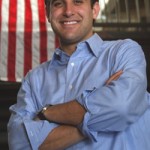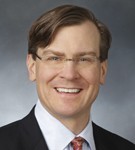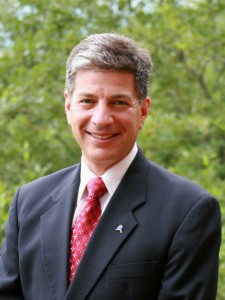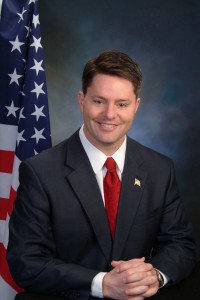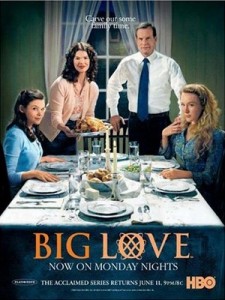Contributing RP, former Missouri State Representative Jason Grill, and Republican Annie Presley of the Bryan Cave Law Firm take on the Missouri U.S. Senate race between incumbent Democrat Claire McCaskill and GOP challenger Todd Akin:
|
It says a lot that Romney is still trying to juice up his base rather than reach to the middle. It also spells that his campaign is in trouble that they’re willing to change the narrative they’ve been using. But, and that’s the biggest but in this cycle, there’s all that Citizen United money out there which could just overwhelm conventional wisdom, political reality and electoral logic. The Politics of Media
Paul Ryan edition: Following the announcement of Paul Ryan as Mitt Romney’s choice for the VP slot on Saturday morning, the campaign says it chose what would generally be considered an odd time to break the news because “we’re in a 24-7 news cycle.” [WSJ] [NYTimes] [The Washington Post] TVNewser has a good recap of how the networks covered the Norfolk, Va. campaign event. [TVNewser] But, the Twitters were buzzing long before the Saturday morning event. [Mashable] CBS’s ’60 Minutes’ and Bob Schieffer scored the first joint interview with Romney and Ryan. [CBS] The Fox News/News Corp. patriarch Rupert Murdoch endorsed the Ryan pick on Twitter. [@rupertmurdoch] In other news, CNN’s Sunday line-up looked different over the weekend after the cable network suspended Fareed Zakaria following the journalist’s admission to plagiarism last week. Zakaria recent column for TIME – which has also suspended him – that included portions that appeared to mirror a piece in April’s issue of The New Yorker. [NYTimes]
These promises and efforts have fallen short. To Republicans and many other Americans, Obama promised a lot that he didn’t deliver on, and his recovery efforts broke many of the promises he made about the budget and deficits. Republicans want to keep the campaign on the economy, deficits and our budget problems. Obama needs to keep it on Mitt Romney and how out of touch he is. Ryan is a conservative, but his ability to lay out the numbers in a very factual way will cause the Democrats problems. He will perfectly contrast with Joe Biden. I love Joe; he seems like a great guy who means well, but how did he ever become a senator and VP? Let’s face it: This guy hasn’t seen the ball since kickoff. I bet the Obama team is already shaking about the VP debate. Hopefully they can keep it on foreign policy and not the budget or economy. Sure he is conservative, but he backs up exactly what Republicans want this campaign to be about- A president who understands the economy and jobs, along with a VP who knows the budget and government programs. I’m sure the Democrats will want to make the campaign about their conservative views and how that will cut government programs and hurt people, but even that gets to the debate Republicans want. I don’t know if they can win that debate, but it is worth having and it will be fun to watch.
As Mr. Allen very astutely characterized, Ryan is an ideologue–which is perfectly fine! He is a politician, that is the best thing for an ideologue to be! However, it frustrates me to no end when people say that Paul Ryan is driven by policy. He is clearly not. Like most other people, he is driven by a set of core beliefs in which he has faith. They were also illuminated by Mr. Allen: tax cuts always stimulate, and government spending is fundamentally bad. My biggest problem with Mr. Ryan is that he tries to use policy research and econometrics (my fields of study) to justify his beliefs. Here is an example of what frustrates me: when I was getting my Masters degree in public policy, we had a class which was essentially about how to be a non-partisan research staffer for a legislative branch. One of the lessons we had was about how to deal with policy makers who try to rig the rules of the game to get their research staffs to achieve the conclusions that they want, rather than conclusions that reflect reality. The example for the class? Paul Ryan. (The issue at hand was his 2010 “Roadmap”, for which he asked the CBO to ignore all possible economic effects of his tax cuts, because, as Mr. Allen states above, he believes tax cuts to be stimulatory.) To me, Paul Ryan is Sarah Palin with a better education. His ideas are as conservative and (in my opinion) bad for the county, but he wraps them in fuzzy math to make them seem more palatable to the media adjudicators of our society–and is somewhat successful in doing that.
As somebody who spent a lot of time working hard to understand the economic effects of policy, nothing drives me more mad than seeing a trusted news person reading from a congressional white paper something that defies the basics of policy analysis.
Politically speaking, however, I think that the pick of Paul Ryan furthers my hypothesis that the 2012 election is exactly like the 2004 election–a prohibitive front runner during the challenging party’s primaries who the base really does not like running against a bunch of bad candidates who eventually and inevitably wins his party’s nomination to challenge a President with middling approval numbers but who is fiercely hated by the other party’s base, who chooses a running mate which his base absolutely adores but with whom the rest of the country is somewhat unimpressed. I see the end stacking up a lot like 2004–a clear, but close, reelection of the sitting President. (A fun game is trying to match up the primary candidates from 2004 with 2012–Gephardt-Gingrich, Cain-Dean, Bachmann-Mosely Braun, etc).
I think the pick was the best possible one Mitt Romney could have made. But, as a Democrat, I don’t like him.
 Mitt Romney’s choice of Paul Ryan for a running mate reminds me of John McCain’s choice of Sarah Palin to appease the far right of the Republican party that has become increasingly influential since 2008. Mitt Romney’s choice of Paul Ryan for a running mate reminds me of John McCain’s choice of Sarah Palin to appease the far right of the Republican party that has become increasingly influential since 2008.While Paul Ryan has far more substantive experience and ability to lead than Palin, I believe his views are just as extreme.
McCain and Romney were both considered moderates based on their records, and felt pressured to pick someone to the far right instead of someone who shares their ability to act in a bipartisan manner.
It makes me realize how warped the political arena must be that being a moderate is a bad thing.
The first thing I thought of when I Googled news of Paul Ryan being Mitt Romney’s choice for VP was “He looks like Romney’s Mini Me.” I thought I’d start off my post with this observation but decided to Google “Paul Ryan and Mini Me” to make sure no one else had used it already. Apparently, Mitt Romney had. Reportedly, Mitt when informing Ryan of his choice said, “Mini Me, you complete me.” Which is an even funnier than what I was going to say using the Mini Me line. So, I’ll just leave it at that. I can’t improve on Mitt’s own words. Just read them and pretend like Mitt was joking. Hilarious!! Things like that seem to happen to Mitt a lot. He intends for things to be taken one way, and they end up being taken the other, more obvious way. It’s an endearing quality because Mitt isn’t doing it as an act. It’s sweet. It humanizes him. Really. I suspect with his VP choice Mitt was trying to emulate the most successful VP pick in modern presidential campaigns: Bill Clinton’s choice of Al Gore. It was a surprising and bold move –and like Mitt done by a challenger running against an incumbent president. It created momentum because it reinforced Clinton’s personal brand (DLC democrat) and “just worked” despite politically logical reasons to go a different way. Clinton, of course, didn’t say to Al, “Mini Me, you complete me.” And the pair went on to win the presidency and vice-presidency and govern for 8 years.
Paxton, like Romney, is an outsider and Mormon. He’s a very successful no-nonsense businessman whose small business expertise could temper Romney’s narrow business image as more of a financier than everyday American businessperson, like Paxton’s character. Paxton also has cross-over appeal to democrats—both male and female. When polled, democratic males 18-85 answered “D” by an overwhelming majority to the question, “Which one of Bill Paxton’s wive’s is the hottest? A) Barb, B) Nicki, C) Margi or D) All of them? And another overwhelming majority of democratic males answered “yes,” to the follow up poll question, “If a republican vice presidential candidate could juggle three hotties and still pay all the bills, would you be more likely to vote for that ticket?” Conversely, female voters from both parties polled about Paxton scored him high on “security issues,” “pro-life,” “immigration,” “family values” and “ideal second husband” (interestingly, polling data showed the fact he’d have to be shared with three other women can be a plus for a second husband). And both male and female voters from both parties felt Paxton’s ability to maneuver the temperamental ingénue Margi was a good indication he could work with House of Representatives. A similar percentage believed having managed to keep the attractive but matronly Barb happy all these years showed Paxton could deal adeptly with Sen Mitch McConnell’s dryly sensible and scolding leadership style. And the fact that Paxton seemed to keep Nicki (Chloë Sevigny) happy as a sister-wife had no political significance according the polling, but almost all polled considered it “friggin’ amazing.” Other pluses of a Paxton choice for veep is that he has a casual yet connected air about him to contrast with what some consider Romney’s uptight remoteness. Everyone knows Utah (where Big Love is set) is the country’s most conservative state. So Paxton could simultaneously burnish Romney’s conservative bona fides while also eating into democrats Hollywood’s fundraising edge. Of course, polygamy has been outlawed by the Morman faith and it’s supposed to be politically incorrect (even taboo) to ever mention it was part of the Mormon faith tradition. But in this context it is a clear political plus. I mean, c’mom, let’s be serious. Does anyone believe Joe Biden is suave enough to handle 3 wives?! In the upcoming Centre College debate, Paxton wouldn’t even have to be very knowledgeable about policy. He could merely try to convince voters that Mitt Romney really is a lot like his character in Big Love and it would be a blowout of Biden. An ad running before the debate with each of the sister-wives starting into the camera saying, “Joe Biden, I know Bill Hendrickson (Paxton’s character in Big Love), Bill Hendrickson is a husband of mine. Mr Biden, you are no Bill Hendrickson” would be a potential knock-out punch. A republican Lloyd Bentsen moment on steroids –and Viagra. Even better it would benefit the presidential candidate, Romney, even more than the vice-presidential candidate. And here’s the beauty part. Romney, when notifying Paxton of his choice could still have said, “Mini Me, you complete me.” And Paxton is so cool that everyone would have taken it as a hilarious insider Hollywood joke. Romney would have realized that he stumbled into a brilliant comment that was genuinely funny. And started laughing himself at how inadvertently hysterical he was. And if all that happened standing on stage next to Bill Paxton, it would have been Mitt Romney’s finest, funnest and most human moment in the campaign. And in an odd way, would have perhaps been Mitt’s most “presidential” moment of the campaign yet. Heck, even conservatives would have to admit they kinda liked Romney on that night.  I will offer the obligatory caveat: I know Paul Ryan from serving with him on two congressional committees for all eight years I served in the House. It is not fair to call him a friend, at least not in the way human beings who aren’t politicians use that term, but I liked him a great deal. I liked the little things– when he engaged you in conversation, you had his attention and his eyes didn’t drift in search of a more powerful member, or a potential donor– and I admired the more consequential things, like his genuine smarts and the fact that when he spoke on the floor or in hearings, you heard the product of an active mind that didn’t need ghostwriting or lobbyist drafted talking points. I will offer the obligatory caveat: I know Paul Ryan from serving with him on two congressional committees for all eight years I served in the House. It is not fair to call him a friend, at least not in the way human beings who aren’t politicians use that term, but I liked him a great deal. I liked the little things– when he engaged you in conversation, you had his attention and his eyes didn’t drift in search of a more powerful member, or a potential donor– and I admired the more consequential things, like his genuine smarts and the fact that when he spoke on the floor or in hearings, you heard the product of an active mind that didn’t need ghostwriting or lobbyist drafted talking points.Frankly, I don’t know the politics of the pick. The Obama campaign is way too thrilled at this announcement for me to attribute it just to gamesmanship or wishfulness: they know that the Ryan budget plan has not polled well, that its realignment of Medicare unsettles seniors, and that to some independents (and Newt Gingrich) it looks more like ideological engineering than a response to our current bout of economic stagnation. A campaign that just wrapped a woman’s death around Mitt Romney and Bain Capital, facts be damned, will not shrink from painting Ryan as a cold-blooded, Ayn Rand inspired radical who puts theory over people.
My hope, as someone who wants this ticket to win, is that Paul Ryan, an imminently decent and pleasant man, will look to Americans nothing like the caricature that Democrats are about to paint. The campaigner who has won easily in a district Barack Obama carried has the raw ability to make a case that his budget really is a blueprint for a shared prosperity. I also think he can and will point out that an entitlement structure built for a population that rarely lived past seventy has to be refitted for a future where octogenarians are the fastest rising age demographic; that universal, one size fits all Medicare coverage has always been more a political bribe to sustain support than some solemn moral commitment; that government overpromising its capacities is itself immoral; and that the first casualties of an entitlement train-wreck would be the poor and the vulnerable, and that they above all need the current compact to be amended so its best parts can survive.
My other hopes are that Paul Ryan’s reformer instincts aren’t just built around budgets. Conservatism needs to adopt education reform as a cause, not as a wedge against the selfishness of teachers unions, but as the most effective instrument to reduce inequality. Conservatism needs not just to repeal Obamacare but to replace it with a market based correction to the inadequacies of the status quo. The political right has to reclaim legal immigration as a point of pride and to distance itself from overheated claims about “us” losing “our” culture: that means much less talk about “self-deportation” crusades against illegals, much more confidence in assimilation, much more focus on an immigration regime that privileges individual responsibility and families.
The guy I admired from across the aisle and sometimes chatted with gets all of the above. I also think that Ryan knows that his party’s (and now my party’s) future rests on conservatism growing and adapting to a changed economic world in a way that liberalism never has.
So, without minimizing the risk in claiming a space that Democrats have effectively attacked for years, I felt inspired seeing Paul Ryan rise from obscurity to the epicenter of politics in the last 24 hours. If this ends well, a campaign that has been accused of running a prevent defense without being ahead may have just made a downpayment on its party’s future.
|
| ||
| Copyright © 2026 The Recovering Politician - All Rights Reserved | |||





